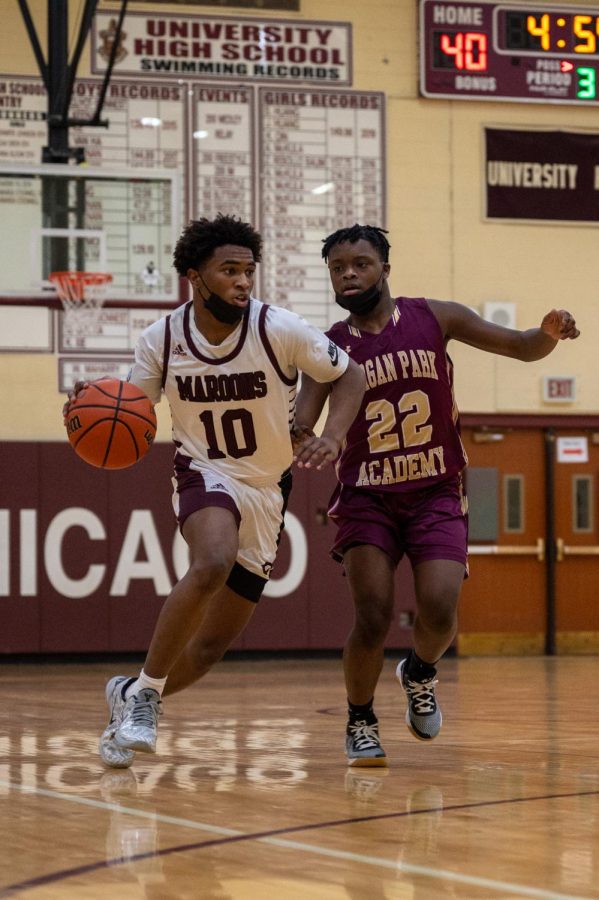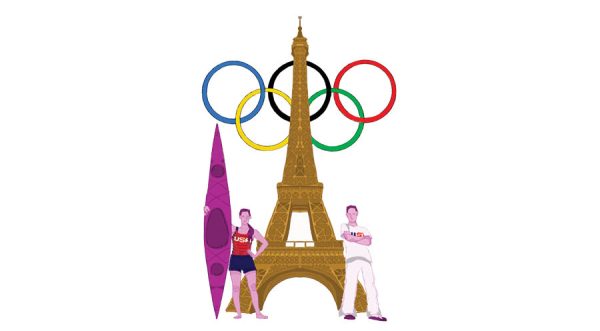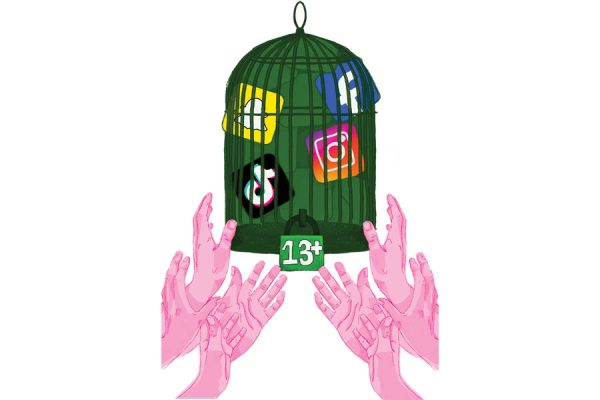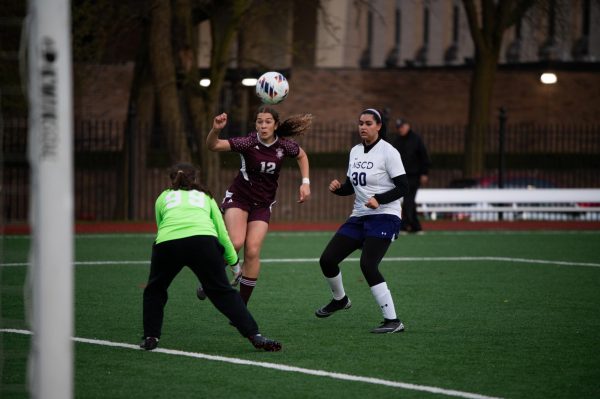Pressure to perform: Students say managing workload, sports comes with cost
FINDING A BALANCE. On Feb. 1, junior Xavier Nesbitt dribbles the basketball in a game against Morgan Park Academy. Xavier and other U-High athletes expressed often-overwhelming feelings of stress when trying to perform at a high level athletically and academically at the same time.
April 1, 2022
Earbuds in, junior Maya Atassi warms up before a basketball game. She stretches fully, jogs a few laps and dribbles the ball, making sure to break a sweat. Adrenaline is pumping, and her body is energized, raring for game time. Maya is eager to get on the court, but the excitement comes with an equal amount of anxiety to perform at her peak potential.
Maya isn’t alone. High school and collegiate athletes face a similarly tough expectation to perform consistently, and an overwhelming amount of constant pressure can lead to mental health concerns. Even world-class professionals such as gymnastics champion Simone Biles and tennis star Naomi Osaka have experienced mental health challenges in performing well at competitions.
Along with expectations to maintain academic and extracurricular excellence, U-High athletes grapple with both internal and external pressures to perform athletically at the highest level, a struggle that has at times adversely affected their well-being.
According to soccer player Milo Jarard, a source of pressure comes from the desire to fulfill the expectations of others. He believes the ambitious standards that his coaches and teammates set contribute to a significant amount of stress.
“When you play at a certain standard, you’re expected to perform well,” Milo, a junior, said. “I don’t know how to explain it, but you kind of have to perform, or you get moved down or you don’t play. So you have to maintain a certain level.”
Ninth grader Juliana Walker holds herself to a similarly high standard when playing volleyball, but her pressure comes internally instead of originating from a coach or a peer.
“Personally, I’ve been playing volleyball for a very long time. So I always feel like I want to be better. I feel like I need to be the best on my team,” she said. “I feel like I’ve been playing for so long. I should already be good at this, and when I make a mistake, it can get hard.”
For Milo, as the pressure increases, the fear of disappointment and losing also compounds, turning the situation worse and negatively affecting his performance.
“Your coach pressures you to play well, and then you’re like, in your own head, ‘Oh, I have to play well,’” Milo said. “And then if you mess up, then you’re like, ‘They’re probably mad at me.’ And then you get nervous, and you continuously play worse.”
To make matters more difficult, student athletes must manage their academic workload and other extracurricular activities, all while taking on intensive athletic practice schedules.
Junior Xavier Nesbitt has experienced the strain of balancing academics and basketball, which has led to negative consequences such as sleep loss and cutting back on the sport itself.
“Being at Lab, there have been times where I had to cut down on the amount of basketball I was playing in order to fulfill my responsibilities in school,” Xavier said. “And, when I don’t want to cut back on anything, I will sacrifice — you know, like anybody — sleep in order to get more time in the day to do everything I want to do.”
As Xavier has begun the stressful college admission process, he feels added anxiety from participating in the athletic recruitment process.
“Especially with the standardized testing, and things like that, those are all really big, really important to the recruitment of any athlete,” Xavier said, “so I guess there’s definitely a lot of pressure to do well on those, and at the same time, to get good grades.”
Maya finds it difficult to excel in taking a full schedule of advanced classes while juggling sports commitments.
“That sort of mental strain and stress also affects how I perform in class, how I do on tests and things like that,” Maya said. “At school, it’s sometimes sort of hard to balance, you know, the tough classes, and it seems sometimes close to impossible to get an ‘A’ in this class and also be doing sports at the same time.”
At school, it’s sometimes sort of hard to balance, you know, the tough classes, and it seems sometimes close to impossible to get an ‘A’ in this class and also be doing sports at the same time.
— Maya Atassi
Xavier said in addition, when things aren’t going well athletically or academically, it can lead to hard times, like nothing in life is going his way.
“ I feel like that creates really low lows,” he said. “Personally, I can’t say that has put me into certain depressions, but I can say it has made me days-on-end pretty upset, pretty sad. It has affected my mood greatly.”
While some of Milo’s teachers understand the amount of time and commitment that playing both school and club soccer requires, he finds others are less accommodating.
“A couple of teachers that I have are very considerate of my time, but for the most part, I don’t really get extensions or extra help,” Milo said. “I’m expected to complete the same amount of work in the same amount of time given as everyone else. It’s awfully challenging to balance everything.”
Both Maya and Juliana appreciate Lab’s no-cut policy for athletic teams, as they believe it encourages players of all levels to enjoy the sport while improving in a low-stress environment. However, Milo believes external expectations still permeate the athletic environment, so even though teams are deemed no-cut, in reality there is always pressure to perform better.
“You want to show the school and your friends when you go out and play and people watch you — like, you want to play well for everyone,” he said. “So like, even though it’s a no-cut team and there are not supposed to be expectations, everyone definitely feels pressure to compete and be one of the best players and play as well as they can.”




















